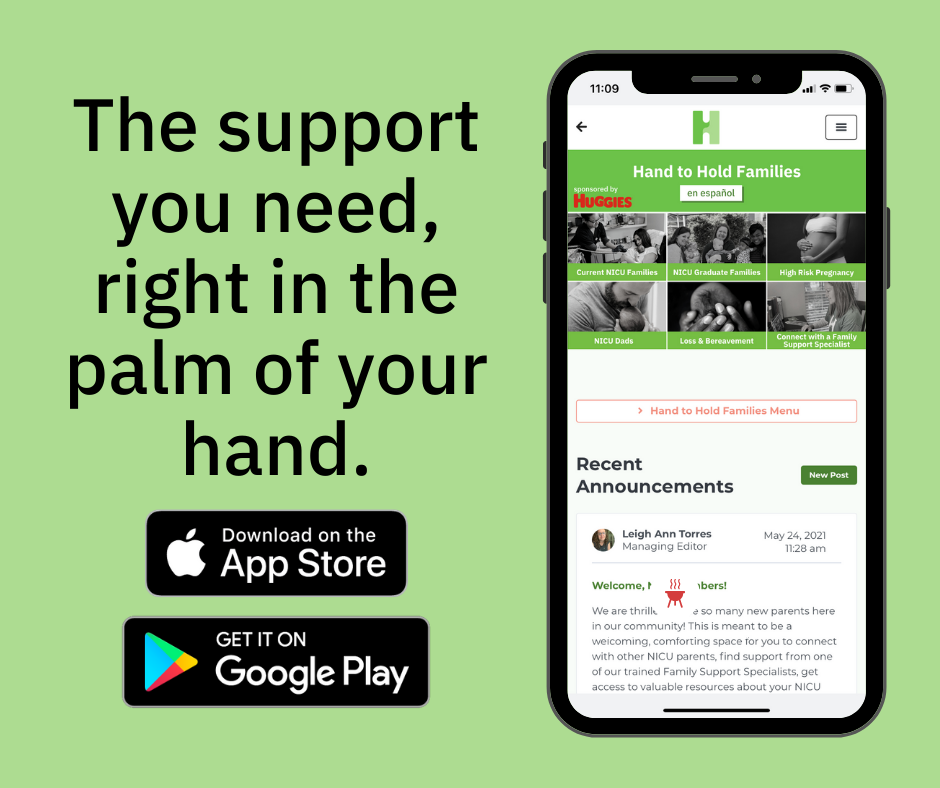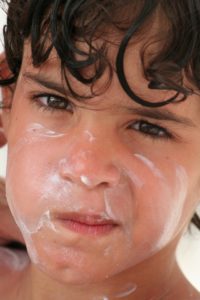UPDATED JULY 2020
This page contains affiliate links. Hand to Hold only recommends products we’ve either personally checked out ourselves or come from people we know and trust. For doing so, Hand to Hold may receive a commission, which helps us fund the development of the valuable resources we provide to NICU families.
Summer means sun and fun, and if you’ve recently emerged from isolation at the end of RSV season, you are more than ready to take advantage of the longer, warmer days by visiting the park or the pool.

Photo credit: Westlake Dermatology
Being out and about means you’re going to want to protect your baby from the sun’s harmful rays. But what kind of sun protection is best for babies, premature babies, or babies with sensitive skin? We spoke with Lisa M. Rhodes, MD, of Westlake Dermatology in Austin, TX, to get up-to-date answers on how to best keep your child safe in the sun this summer.
When can my baby use sunscreen?
Most, if not all, sunscreen bottles will carry a warning on the back claiming either to not use on babies under six months, or to consult a doctor prior to using. Dr. Rhodes recommends that parents of babies under six months of age dress their babies in sun protective clothing, such as rash guards and hats, and avoid prolonged periods of direct sunlight.
The American Academy of Pediatrics states, “when adequate clothing and shade are not available, parents can apply a minimal amount of sunscreen with at least 15 SPF (sun protection factor) to small areas, such as the infant’s face and the back of the hands.”1
What sunscreen levels should I use for babies and children?
Dr. Rhodes recommends all of her patients over six months of age use a sunblock with an SPF of at least 30.
What ingredients should I look for or avoid?
When it comes to sunscreens, there are many choices, and it can be hard to narrow it down if parents don’t know what to look for. Dr. Rhodes recommends looking for a product containing the ingredients zinc oxide or titanium dioxide in at least 30 SPF. Both are physical sunblocks that will provide the most protection from the sun’s harmful UVB rays.
How often should I reapply sunscreen?
While the standard recommendation states to reapply every two hours when swimming or sweating, Dr. Rhodes recommends every hour. “Hourly time limits are easier to remember, and we are often not as good about adequate coverage when reapplying,” she says. It’s easy to lose track of time at the pool or beach, so set the timer on your phone for an hour and keep a close eye on the clock.
Can I use a spray-on sunscreen?
“Spray-on sunscreens are great for ease of use, but unfortunately don’t get adequate coverage,” says Dr. Rhodes. But if you do use it, she recommends users spray the sunscreen on the body no more than three inches from the skin and rub it in afterwards for even distribution. Do not spray sunscreen on the face. Instead, spray into your hand, then spread onto the face. “Creams are better for coverage,” she says, “But sprays can definitely work well if applied correctly.”
What products are best for babies with sensitive skin?
If your baby or child has sensitive skin, look for a product in a “pure” line with fewer preservatives. Dr. Rhodes recommends Elta Pure and Vanicream as excellent choices for babies with sensitive skin.
Does sunscreen expire?
Yes it does. Check your bottle for expiration dates. In the absence of an expiration date, Dr. Rhodes says to replace bottles if they are over a year old, or six months if the product has been kept in higher temperatures such as a hot car.
My baby got a sunburn! What can I do?
First of all, don’t beat yourself up. Soothe the sunburn by applying cool compresses to the affected area. Dr. Rhodes also recommends easing pain by applying topical aloe vera gel and giving a dose of children’s ibuprofen. Make sure to refer to the age/weight recommendations on all medications.
If you’re still a little overwhelmed by all of the choices out there, Alpha Mom has an extensive sunscreen guide last updated in 2016 that is a great resource for parents. Finding the right protection for your baby or child is just one less thing to worry about this summer.
Source
1″Sun and Water Safety Tips.” American Academy of Pediatrics, n.d. Web. 14 July 2017.
 Announcing the Hand to Hold mobile app and online community, a safe and inviting environment to connect with hand to Hold Family Support Specialists and other NICU parents to find support whenever and wherever you need it. Learn more.
Announcing the Hand to Hold mobile app and online community, a safe and inviting environment to connect with hand to Hold Family Support Specialists and other NICU parents to find support whenever and wherever you need it. Learn more.

